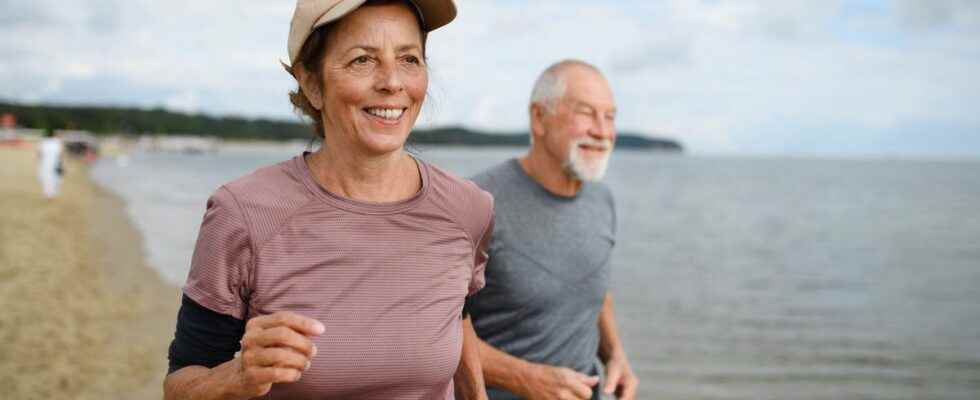Published on
Updated
Reading 3 mins.
in collaboration with
Dr Christophe de Jaeger (Longevity and geriatrics)
According to a Japanese study, a pill could replace sports exercise. A treatment that could help people suffering from locomotor fragility. Explanation with Dr. Christophe de Jaeger, physiologist, specialist in aging and president of the French Society of Medicine and Physiology of Longevity.
Muscle isn’t just for locomotion. It is also a reserve of proteins for the body and plays on the metabolism of sugars, very important to maintain in the context of health. This is why many scientists are looking for a biological solution to maintain or strengthen this muscle mass.
A complex Japanese study
In a new study published in the journal Bone Reachthe team of scientists from the Tokyo Medical and Dental University (TMDU) have identified a new molecule that could help in the treatment of locomotor fragility by inducing effects similar to those of physical exercise.
According to the researchers, physical inactivity leads to weak muscles and bones – specifically sarcopenia and osteoporosis, which can lead to loss of autonomy.
“Muscle is a major concern for all aging people. We begin to lose muscle from the end of adolescence in a natural way. When you are sedentary and do not exercise regularly, you lose muscle very early and you will get sarcopenia. It will be correlated with all serious age-related illnesses (loss of autonomy, impairment of cognitive functions, nutritional disorders, cancers, strokes, etc.)“, says Dr. Christophe de Jaeger.
In order to carry out their work, the researchers used a new sequential drug screening system, which enabled them to identify an aminoindazole derivative: locamidazole (LAMZ). This molecule would make it possible to give a signal, as if the person were doing physical exercise, that is to say deceiving the muscle.
Study results
For their study, LAMZ was administered to mice orally and then released into the animal’s bloodstream. According to the researchers, the administration was successful and no side effects were detected.
“We were delighted to find that LAMZ-treated mice exhibited greater muscle fiber width, greater peak muscle strength, higher rate of bone formation, and lower bone resorption activity”rejoices the lead author of the study Takehito Ono.
“This discovery could be really interesting in individuals who cannot improve their muscle mass through physical exercise, due to impaired mobility. If these people succeed in regaining this muscle mass, it would restore their autonomy. It would be a very good thing“, explains Dr. Christophe de Jaeger.
Diversion and overconsumption: the fears of the expert related to the use of this pill
As soon as the pill becomes available, Dr. de Jaeger is convinced that people – especially those who do not want to exercise – will overuse this product. “It will be hell. People will literally jump on it”expresses the practitioner with concern.
“For many people, exercising doesn’t inspire much excitement. If they could find an elegant solution to gain muscle without making the slightest effort, it would be very pleasant news for them, but physiologically unsuitable. There really needs to be an awareness that physical activity – not sport – contributes to the natural maintenance of the body. In this sense, we must agree to make“, explains the physiologist.
“I am very afraid that younger individuals will divert the use of this type of drug for purely sporting reasons or physical appearance. It risks bypassing physical activity with all that it has of beneficial”, worries the specialist.
Results to be confirmed in humans
Today, despite the rather satisfactory results of this study, the undesirable effects, the contraindications of this pill, or even its effects on a larger population, are still unknown, wishes to specify Dr. de Jaeger.
Be careful, according to the expert, “this study was carried out on mice. It is possible that the effects observed on its rodents are not the same as in human beings. It is even possible that they are different. That’s why you shouldn’t rush too quickly.”
Finally, according to the study’s team of researchers, LAMZ represents a potential therapeutic method for the treatment of locomotor frailty by mimicking the effects of athletic exercise, including sarcopenia and osteoporosis.
“Before implementing this type of treatment, other more in-depth studies must be necessary”concluded Dr. Christophe de Jaeger.
